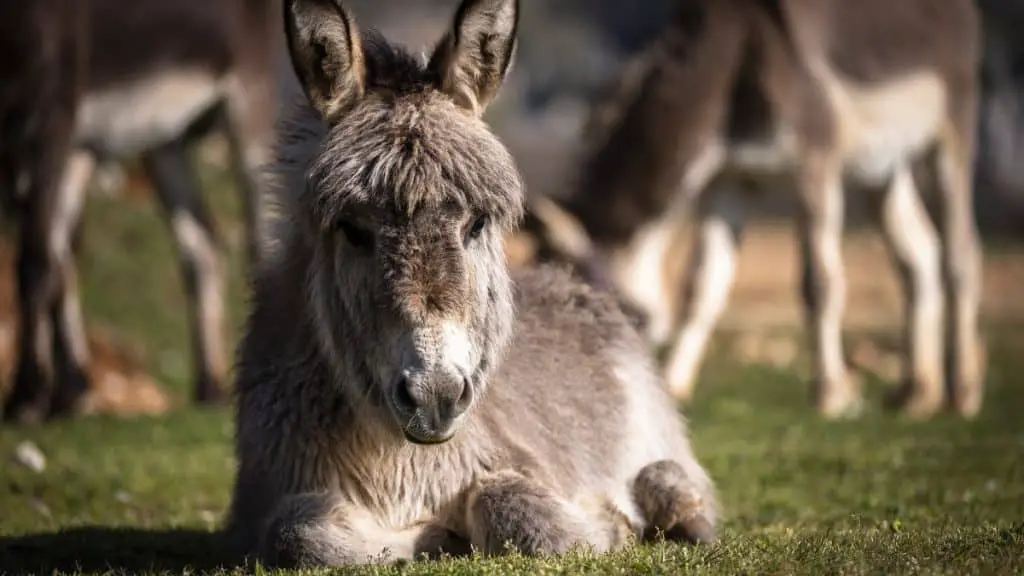Skip To Section
If you’re thinking of taking on a donkey, one of the key questions you’ll want to answer is “how long do they live?”
Donkeys in the wild usually live 20-30 years, and they can live as long as 50 years in captivity – maybe even longer!

How Long Do Donkeys Live In Captivity?
Donkeys in captivity often have easier lives than their wild counterparts – though not always, of course, as donkeys are commonly used for work and may not be treated well.
Donkeys in captivity average about 33 years, according to National Zoo. This does depend on the type of donkey and their living situation.
Domesticated donkeys usually live longer than wild donkeys because, of course, they do not face predators, food shortages, or the trials of hot weather without shelter.
You might expect that miniature donkeys, being smaller, would have a shorter life span, but in fact, their life expectancy is also set at 25-35 years by Story Teller, so similar to a full-size donkey. It’s not clear if any types of donkeys live longer than other types, but their long life expectancy takes many people by surprise.
How Long Do Donkeys Live As Pets?
Pet donkeys, if well cared for, should live to at least the average life expectancy unless they run into health problems or have an accident. They will have relatively easy lives, and if they aren’t stressing their bodies with a lot of work, you should expect them to live for up to 40 years.
Of course, pet donkeys do run the risk of being spoiled, which may affect their health and life expectancy to some degree – we’ll go into more detail shortly on what the risks are and how you can avoid them to keep your donkey as healthy as possible.
How Old Is The Oldest Living Donkey?
So, with all that in mind, how old can these amazing creatures live in the best possible circumstances? Of course, few animals hold the title of “oldest” forever, and there seems to be some confusion about how old the oldest donkey is.
According to the BBC, Bubbles the donkey is currently the oldest living donkey in the world. At 60 years old in 2019, there has been no news to say that Bubbles has died, which makes her the oldest living donkey today.
Bubbles is said to have arrived at the UK farm where she lives in the early 1990s and loves being greeted by visitors and spoiled by the staff. She is quite extraordinary, and may also be the oldest donkey ever, as well as the oldest living – although the claim is somewhat complicated.
The Oldest Donkeys
Guinness World Records lists Suzy as the oldest donkey. She died at the age of 54, in 2002. Suzy lived in America and had just two different owners. She was born in 1949 (ten years before Bubbles) and dwelt in New Mexico, with her owner, Beth Menczer.
There’s also Pepper, a donkey in Cornwall thought to be in her 50s, according to Cornwall Alive.
An even more extraordinary challenger, Triple Crown Feed has a story on Flower the donkey, who they claim reached a full 70 years of age. That is incredible, at around double the expected life span.
However, there isn’t much to substantiate Flower’s age, though the site does cover a touching story. It shows how donkeys form strong bonds, describing Flower’s friendship with another donkey called Maggie Mae, and how they spent years inseparable from each other.
The oldest donkeys in the world have notably all been female donkeys. It may be a coincidence but could indicate that jacks (male donkeys are called jacks) do not live as long as jennies.
Factors That Determine A Donkey’s Lifespan
The life expectancy for a donkey varies quite significantly, and it may be that one donkey breed will live longer than another. Standard donkeys live about 30 years, and so do mammoth donkeys (such as the American Mammoth Donkey).
The Donkey Sanctuary says that a miniature Mediterranean donkey, which originally comes from either Sardinia or Sicily, will also live for around 30 years in captivity, sometimes a little longer. Miniature donkeys are up to 36 inches tall.
It is hard to tell whether the breed makes a major difference to the average lifespan of a donkey, but it may make some. However, there are very few purebred donkeys, so most are a mix of at least a few breeds.
The African wild ass, of course, will face many more perils and hardships throughout its life, and this will reduce its life expectancy.
However, the main factor that affects a donkey’s life span will be its health.
Proper care and careful management of diet will be crucial to helping a donkey live a long time – just as for any other animal. You will also need to think about their mental health (roaming space, companionship), and physical health.
How Old Is A Donkey In Human Years?
If you want to know how old your donkey is in the equivalent of human years, an approximate guide is to times your donkey’s age by three, according to Age Converter.
By the time your donkey is six years old, it’s 18 in human years. That means that by 20, your donkey has reached 60. That makes Bubbles, the astonishing 60-year-old donkey, an incredible 180 years by human standards!
This method will not always work exactly, especially during the very early stages of a donkey’s life, but it should give you an idea of how old your donkey really is in comparison to you.
How To Help Your Donkey Live Longer
1. Food
Donkeys need to have relatively well-managed diets, as they can easily become overweight if they are allowed to graze freely in grass or given lots of rich food. They are not like horses or most other grazers.
You should spend time researching the right foods for your donkey’s time of life, and adjust what they get accordingly.
An older donkey may need higher calorie diets, and many donkeys struggle to eat the high-fiber foods they need as they age, because they suffer from dental problems. You can buy specifically designed donkey feeds that will help them to continue eating and ensure they get all the nutrients they need.
Some donkeys with particularly bad teeth may require food to be processed into a mash before they can eat comfortably. The Donkey Sanctuary lists some of the foods available for donkeys that are struggling to eat.
Treats should also be supplied, but in monitored quantities to avoid weight issues which will put extra strain on a donkey’s legs and joints.
Making sure a donkey gets everything it needs in its later life will help to keep it healthy for longer – and a good diet is invaluable throughout a donkey’s life.
2. Balanced Rest And Exercise
A good balance of rest and exercise is important for your donkey, and you should adjust your routines if necessary.
If your donkey is a pet and not used for work, make sure it is exercising enough and has space to roam. If your donkey is a working animal, make sure you are also giving adequate rest time, especially as it gets older.
Donkeys are hardy creatures and – though stubborn about not over-working – may not always show when they are in pain. Exercise is important, but should always be coupled with a good understanding of your donkey’s physical condition and needs.
If a donkey is overweight, it needs more exercise, but this should be built up to gradually, giving muscles and joints time to strengthen before they are stressed.
3. Dental ; Hoof Care
Donkeys suffer from teeth problems, especially as they age. They should regularly be taken to a vet to ensure their teeth and hooves are in good condition. This will help them to enjoy a healthy diet, and to pick up on any problems become they have time to get serious.
According to The Horse, a senior donkey ought to be seeing a vet twice a year, especially for teeth check-ups. They need a farrier every month and a half or two months to check their hooves are still good and not causing them pain.
A donkey that has not been well cared for in its younger years will need these checks even more than a donkey that has enjoyed good care throughout its life.
4. Mental Health
Like people, donkeys need to feel good emotionally as well as physically, and they have complex emotional needs. Very high on the list of needs is companionship; donkeys form extremely strong social bonds.
A donkey may not be a herd animal the way that a horse is, but they are certainly pack animals, and appreciate companionship with others. They will be happy in small groups or just pairs, but many donkeys are unhappy if kept alone.
You can pair a donkey up with a male horse or female horse, but this can cause problems as horses tend to be bossy animals, and also eat a richer diet than donkeys, making feeding and grazing ground problematic.
Conclusion
Donkeys can live for amazing lengths of time, and a donkey that is well cared for may astonish you in how long it lives – and possibly even works – for. These hardy creatures are incredible, but you should make sure that older ones are not hiding pain or problems.
Regular vet visits, a careful diet, and lots of love will help donkeys to both extend and enjoy their senior years, and might see them challenging some of those record-winners with their longevity.
